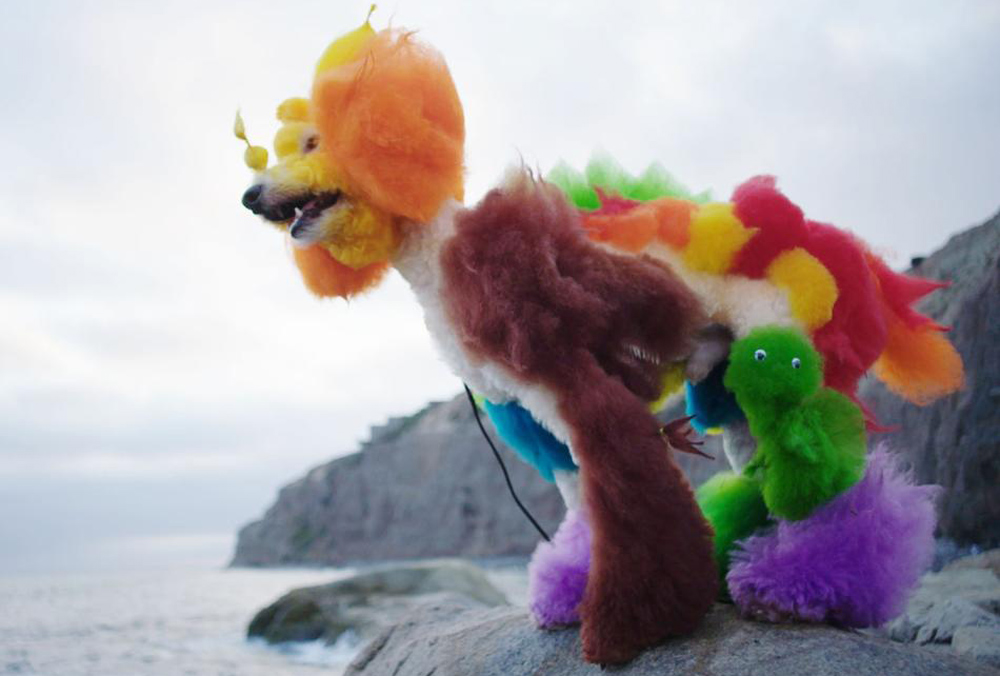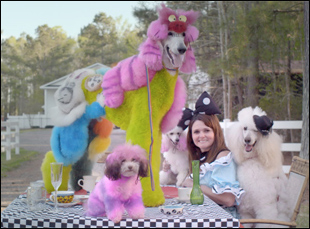They say you should never make a film where you work with kids or animals, but knowing how well-behaved the dogs in “Well-Groomed” were going to be, Rebecca Stern threw caution to the wind for her feature directorial debut.
“These women are so good at training their dogs — I have a cattle dog basenji mix and we did not do nearly as good of a job training him,” laughs Stern in Austin for the film’s premiere at SXSW. “They’re show animals as well, so they’ve been trained from eight weeks old until you see them [now] to be used to being groomed and take direction really well.”
Yet as calm and poised as the canines may have been in front of the camera, it’s their fur that’s out of control, though of course that’s what drew Stern, a documentary veteran who worked as a production coordinator on “Cartel Land” and a producer on “Netizens,” to start following them in the first place. Bursting with every color of the rainbow and coiffed into mural-like odes to Harry Potter and “The Wizard of Oz” on the side of their bodies, this hair of the dog is indeed intoxicating as the film tracks a year in the life of a quartet of creative groomers, as they’re known, who compete by putting their pets onstage with the most outrageous hairdos they can conjure, often joining them by dressing up in complimentary ways.
However, Stern captures the women who have pioneered this new strain of pet grooming remaking themselves in other ways, using the newfound outlet for their creativity as a means of being able to finally express themselves for who they are. It isn’t only the dogs who show plenty of personality, but their owners such as Adriane Pope, a skilled South Carolinian poodle primper whose home has a full-sized boarding kennel; Cat Opson, who worked her way up from PetSmart to become her own boss in Dana Point, California; Angela Kumpie, who is credited with all but inventing creative grooming and reaps the rewards of being able to sell dyes and teach her technique to the other competitors, and Nicole Beckman, who can be seen gaining confidence as she learns the ropes both of creative grooming competitions and of being a good businesswoman after her boss decides to retire and she inherits her salon.
Armed with a self-aware sense of humor and an energetic score from Dan Deacon, “Well-Groomed” is a delight from start to finish and in the midst of a wild SXSW where the multicolored dogs stood out even amongst the madness on Sixth Street, Stern spoke about how she was able to apply her own experience of being a first-time director to watching these women find their calling in creative grooming.
I was learning about documentary film in New York and looking for a way to pair that with my intense love of animals, so I started researching and I ended up going to the Tompkins Square Park Dog Show. It’s like a Halloween Dog Art Fair [where] a lot of dogs dressed up. [I thought] “Oh, this is interesting. Let’s do a little bit more digging,” and I ran across creative grooming. Doing that research, I got in touch with a dog publicist, which is a thing that exists, and she connected me up with all these women because every time I asked about it, everybody would repeat the [same] names, like “Oh you should talk to Angela Kumpie, you should talk to Adriane Pope…” So we ended up connecting with them over Facebook at first and then I flew out to the Pasadena Groom Expo West, which is one of the big shows, and was just like “Hi, my name’s Rebecca.” [They said] “We don’t know who you are.” [And then I said] “Okay, well, I’m going to hang out with you guys for the next four-and-a-half years.”
What I found so moving about the film is seeing these women are finding their sense of purpose. Did that contribute to how you selected them as subjects, being of various ages?
It was definitely a process of development. I was just following what I found most interesting [which] ended up being trying to understand these women’s motivations and what made them happiest — that happened to be their animals, so I ended up focusing on that and their personal journeys to get to an end goal, which for me at the time was so important for me because I’m a first-time director, there was also a sense of discovery for myself. You understand someone who’s taking the small steps to get to something that’s much bigger and I just thought that was lovely. I also wanted to make sure that “Well-Groomed” was a movie that you could relax while watching it. It’s really not supposed to be any hard-hitting, purpose-driven film. You can enjoy the people while you’re with them, so I wanted to focus on the things that gave them that happiness.
Meeting Nicole in general was one of the best things that happened to the film. For a really long time, I was only following Adriane and Angela. Then I started to get to know Cat Opson and I was like, “Okay, this is interesting because she’s half in the creative world and half in the creative dog grooming world,” which is its own kind of entity, but then meeting Nicole, this is someone who’s just starting out, figuring out how to do this right and how to use this to get closer to her animals. I enjoyed spending time with her and for the film, it really adds a universal, goal-oriented ambition, you want to see [the evolution of the competitors] from start to finish, so you get that with Nicole [who’s starting out] and with the other women who are at the top of their game.
You have this great motif in the film of conducting the interviews inside the women’s homes where you really get a sense of them from the background. Did they all have such a place that lent itself naturally to that?
It’s [really] just their homes. We did almost no set dressing for any of the interviews. We [did] plan to shoot very specifically. My director of photography Alexander Lewis and I thought about how we wanted to shoot this because we wanted to allow the women the space to act the way they wanted to, which is why you get big, wide shots in it, but then we also really wanted to show the details of what they were doing because it’s so extreme and not like anything you’ve seen before, so how do you figure out how to make the film feel really big, but then show all the minutiae? That’s how the couches [made it in], feeling big and giving people the context that’s around them.
Since it takes the form of a competition film to some degree, did it concern you the game seems so heavily tilted towards Angela, who isn’t only an intimidating competitor but basically teaches all the techniques and sells all the products to others?
The thing with the competition is each of them [that happen] during the year all have slightly different rules and regulations. They’re also judging art, so you’re never entirely sure of what the judging parameters are for the women, so it was really hard to systematically display that throughout the film, which is another reason I ended up focusing on their ambition because [while] there’s this competition element, they’re not really that focused on the competition because it changes all the time. And Angela is definitely the queen of it, so it helped me pick her as a subject. But then it was a complete crapshoot as to who would win at the end. I had no idea.
The score is also surprising and quite lively. What was it like working with the composer Dan Deacon?
It was so much fun. In movies that involve animals, the tendency is to go towards something very cutesy with the music, like “dee-dee-dee” trying to emphasize the animal walking or something that feels cute or young. And Dan and I were like, “Nah, we’re not doing that.” But we also didn’t want to do any of the classic documentary synths where you just get droning music because it’s not that documentary either. It’s got to be bright and cheery [where you] still feel a little bit of fantasy. Dan and I actually worked for quite a long time on the score and we got together a group of musicians in Baltimore to live record most of that. Then he went through and recut everything into the melodies you end up hearing in the film.
For you, was it much of an adjustment moving from producing to directing?
It’s such an adjustment. After directing a film, I have so much more compassion for all of the directors I’ve worked with. I love producing and I’m very goal-oriented and list-driven. I like to have to-dos and seeing the plan, like if I’m going to go from point A, I need to get to point B and [with] directing, point A and point B might have a lot of different things in between them that you might have to do first before you get there. It’s more process than it is linear, which is what thinking like a producer is. Even if you’re thinking about the whole picture, you’re thinking about what the next step is. So it was more difficult than I thought to transition from producing to directing, but I’m excited to do more directing. I really enjoyed it, and I have a great producing team, so that was a huge help.
What’s it like to be at the finish line with this and be at SXSW?
It’s great and it’s overwhelming. Being at this festival is such a great thing and they’ve been taking amazing care of the film. I couldn’t have thought of a better audience to show it to first.
“Well-Groomed” premieres on HBO on December 17th at 9 pm.





